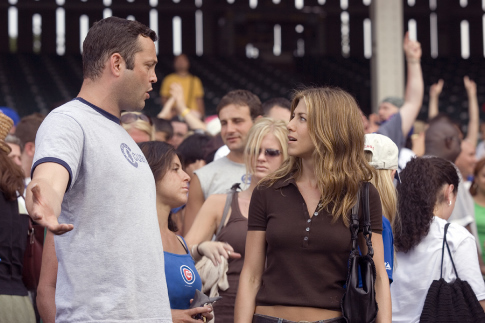

|
The Break-Up
6 out of 10 |
 |
|
When I first started watching, I was wondering what genre of summer movie it would turn out to be. My first impression was romantic comedy, but there wasn't enough romance. Then I thought it might be black comedy, a modernized version of "War of the Roses", but again I was wrong. Eventually I realized "The Break-Up" was indeed what its moving force, Vince Vaughn (Gary the boyfriend), called an anti-romantic comedy. "The Break-Up" is about adults growing up. Gary and Brooke (Jennifer Aniston) are in a long-term relationship and co-own a condo unit when irritations in the relationship boil over after a family dinner. The two families themselves are mismatched caricatures (Polish-American working class versus Brahmimn old-money) who manage to ruin the dinner all by themselves. Brooke tries to make Gary see he needs to change his ways and does a terrible job of explaining herself, while Gary fails to try and make up with her immediately. After this, both Gary and Brooke become increasingly childish as time goes by. I almost felt I was watching a gradual regression to childhood as they both indulge in increasingly juvenile behavior. The main scene of battle is the use of the condo unit, but the plot needs this only to generate some comedic scenes. The battle could just have easily been over the couple's pet (they don't have one) or the entertainment system (to which Gary is addicted). Both Gary and Addie want to make the other the one to surrender and come crawling for forgiveness. The climax comes when the condo unit is sold and time is running out for sanity to break out for the relationship. I won't spoil the ending, but I shallsay I was pleasantly surprised by the direction Jeremy Garelick's script took. Peyton Reed directed this original effort and does a reasonable job with it. One flaw was that Vance and Aniston didn't have any chemistry as a couple, which weakened the message of the film. If they had been smoldering for each other but were still playing stupid one-up games the idea would have worked much better. Since we don't really see the couple when they're happy, the impact of the break-up is lessened. Incidentally, Universal's PR people are trying to get a Vance/Anniston romance story into the press in order to boost the movie: don't believe a word of it! Another peeve of mine was that many of the support characters, such as Brooke's boss Marilyn Dean (Judie Davis) and Gary's obnoxious friend (Jon Favreau), are amusing one-dimensional cut-outs of real people. If you're trying to challenge the audience to think about the message of the film, you should really make all the cast more complex characters. Still, it is not clear which target audience this film is aimed at, which might explain the confusion. In the end, though, I did laugh and take the message to heart. Mostly Succeeds
Film Critic: Douglas A Gunter
|
|